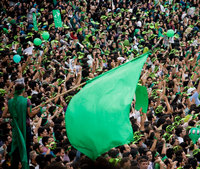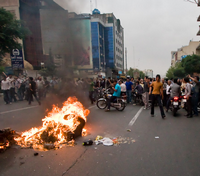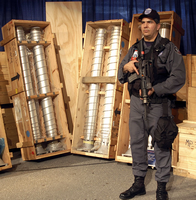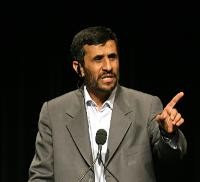It looks like the Iranian regime has found its strategy fordealing with the opposition: decapitate the organizational leadershipthrough targeted, “quiet” arrests, while co-opting the visibleleadership through open-ended “dialogue.” This is where thingsget very tricky for Moussavi to navigate. If he rejects the GuardianCouncil’s overtures out of hand, he is essentially rejecting theregime’s institutional legitimacy, thereby pushing him over the edgefrom protest into revolution and giving the regime a credible reason toshut him and his demonstrations down. But if he engages too earnestly,he runs the risk of losing momentum for the movement, with littlerecourse if the ruling ultimately turns out unfavorable, […]
Iran Archive
Free Newsletter

In Iran, hundreds of thousands of citizens are bravely defying state laws barring protest, with reports emerging of students and demonstrators being beaten and even shot. President Barack Obama has muted his response so far, taking note of the violence, while taking pains not to feed historical Iranian perceptions of U.S. meddling. Some have criticized him for not taking a stronger stand, echoing widespread charges that Obama downplays human rights more generally in his foreign policy approach. The critics are right: Obama has prioritized stability and the shoring up of U.S. power over the vocal advocacy of human rights. But […]

TEHRAN, Iran — Iranian authorities have ratcheted up their campaign against anti-government demonstrators by calling in the hard-line militia, the Basij, to enforce order with brute force. Tehran has been the site of massive street protests on a scale unseen since the Islamic Revolution in 1979. Tens, and sometimes, hundreds of thousands have defied government bans, live gunfire, tear gas and mass arrests. Thursday saw hundreds of thousands choking Enkeleb Street, a main thoroughfare — clad in black to mark the killing of eight protesters by the Basij, with many carrying white flowers or photos of their dead comrades. But […]
So far, I’ve been agnostic about whether the vote count of the Iranian election was rigged or not. But this CSM interview with Farideh Farhi of the University of Hawaii (via Yigal Schliefer) is pretty compelling. As part of her decades-long research on Iran, Farhi has routinely gone over historical data from Iranian elections with a fine-tooth comb. She concludes that the Interior Ministry “pulled [the numbers] out of their hats,” and that the announced results are a “brazen manipulation.” As an empiricist, I give that kind of analysis more weight than either the educated conjecture of the Leveretts arguing […]
Tea-leaf reading is about all we can do, after all. But having said that, this Noah Millman exercise in that fine art (via Andrew Sullivan) is a solid primer in terms of which moves to watch in the internal power struggle currently being decided in Tehran. Two thoughts. First, Le Monde is “reporting” (I put that in quotes given how uncertain the situation on the ground is) that Mir Hossein Moussavi has called on his supporters to cancel the planned opposition demonstration today, after supporters of the regime scheduled a counter-rally in the same location one hour prior. The decision […]

In his April 5 disarmament speech in Prague, President Barack Obama endorsed constructing “a new framework for civil nuclear cooperation, including an international fuel bank, so that countries can access peaceful power without increasing the risks of proliferation.” An international uranium fuel bank seeks to address one of the fundamental problems with the Nuclear Nonproliferation Treaty (NPT) — namely, that it allows countries to acquire sensitive nuclear technologies that they can then rapidly convert from civilian to military use. According to the most common interpretation of the treaty, states can develop extensive uranium-enrichment and plutonium-reprocessing capabilities while a member in […]
World Politics Review managing editor Judah Grunstein appeared on Bloggingheads.tv yesterday with Henry Farrell to discuss coverage and implications of the Iranian elections, the EU parliament elections, copyright law and drone strikes in Pakistan. The full video can be seen here. Below is the segment on coverage of the Iranian elections:
Another thought: If Ahmadinejad did actually win, and the reformists end up overturningthe regime, our sympathy would essentially be going to a minority-ruleregime of the privileged urban elites over the rural masses. In otherwords, exactly the kind of revolution that progressive Americans havegenerally been opposed to. The ’60s and ’70s Latin American revolutionsso popular with the American left, for instance, were the exactopposite: peasant revolutions against urban elites. Very interesting how globalization has essentially closed the age ofthe proletarian/peasant revolution and restored, on a planetary scale, the originalrevolutionary bourgeois of the 18th century.
Clearly something is happening in Tehran. It is premature to know exactly how deep and broad the opposition really is. Reports of 2-3 million protestors, for instance, seem farfetched in a city whose population is 7 million. But even if the number is far less, the massive demonstrations in defiance of a ruthless regime are terribly moving and awe-inspiring. Events like these separate the realists from the idealists, I suppose. I’ve been called a realist, but it’s hard to apply cold reason to such an inspiring demonstration of the human aspiration to break free of the chains imposed by others. […]
I’ve been digesting the news from Iran, in bits and pieces over the weekend, and a bit more methodically today. And there are a few threads that I think need some teasing out, since they’ve tended to get mixed up in the weave of passion and empathy that’s characterized the real-time blog coverage I’ve seen so far. To begin with, it’s important not to let enthusiasm for the cause of Iranian reformist voters and outrage over their treatment at the hands of the Iranian regime in the election’s aftermath translate into certainty over what remains a very opaque outcome. Western […]
The circumstances surrounding Iran’s presidential election, and in particular the declaration of Iranian President Mahmoud Ahmadinejad as the winner despite opposition accusations of vote rigging, will present difficulties for any attempt by the Obama administration to diplomatically engage the Islamic Republic of Iran. The administration had been circumspect during Iran’s election campaign, but clearly it was hoping for a reformist victory by either Mir Hossein Moussavi or Mehdi Karrubi. Although neither would have guaranteed a thaw in U.S.-Iranian relations, a reformist victory would have made engaging Iran an easier political sell, both in Washington as well as among European and […]

On Friday, just over 46 million Iranians will go to the polls to elect the president of the Islamic Republic to a four-year term. Controversial hardline President Mahmoud Ahmadinejad is the candidate to beat, but he is facing a stiff challenge in an intriguing struggle that has taken shape in the last few weeks of the campaign. Reformist candidate Mir Hossein Mousavi has emerged as the main threat to the incumbent, while another reformist, Mehdi Karrubi, and another hardliner, Mohsen Rezai, are also in the race. In Iran’s unique constitutional system, severe vetting by the Islamic Republic’s political elite determines […]
U.S. coverage of Pakistan’s spotty effort to battle extremists is understandably U.S.-centric. So we hear a lot about what Islamabad should do to contain the FATA-based Taliban who are also feeding the Afghan insurgency. Since last November’s Mumbai attacks and the subsequent unveiling of the Obama administration’s regional strategy, there’s been a bit more attention paid to India’s concerns. But what doesn’t get as much attention as it deserves is China’s concerns about Uighur separatist terrorist groups, and Iran’s concerns about Baloch separatist terrorist groups, both also using Pakistani territory as a safe haven (both via John McCreary). In other […]
Laura Rozen spun her rolodex and got some more on today’s meeting between French President Nicolas Sarkozy and Iranian Foreign Minister Manouchehr Mottaki. Apparently the meeting had been scheduled for a few week’s back and then postponed, so it’s the substance — getting Iran back to the P5+1 negotiating table — more than the timing — U.S. President Barack Obama’s imminent visit — at play here. And according to Rozen’s sources, the Iranian consensus on how to respond has yet to emerge. I’d be surprised if one does before the upcoming Iranian presidential election. It’s hard to tell with such […]
Most of the commentary I’ve seen about the Russian role in the stand-off over Iran’s nuclear program has to do with Russia’s refusal to support strengthened UNSC sanctions to punish Tehran for not being more transparent with the IAEA. But an alternative formulation of that reflection would be Russia’s refusal to pressure Tehran to be more transparent with the IAEA to begin with, thereby avoiding the need for sanctions altogether. So when Russian Foreign Minister Sergei Lavrov says, after meeting with Israeli Foreign Minister Avigdor Lieberman, “We have confirmed the need to assure theinternational community of the exclusively peaceful nature […]
I’ve mentioned before that of the European partners, France might be the most resistant to the Obama administration’s policy of engagement with Iran. The concern, as far as I can tell, is in part ideological, because I really do believe that French President Nicolas Sarkozy is sincerely convinced of the need to keep Iran from even approaching a nuclear weapons capacity. But more than anything, the concern is one of harmonization. The French have been spearheading the European effort to hold the line since the December 2007 NIE, and if the U.S. entrance into the negotiations were somehow parallel to […]
